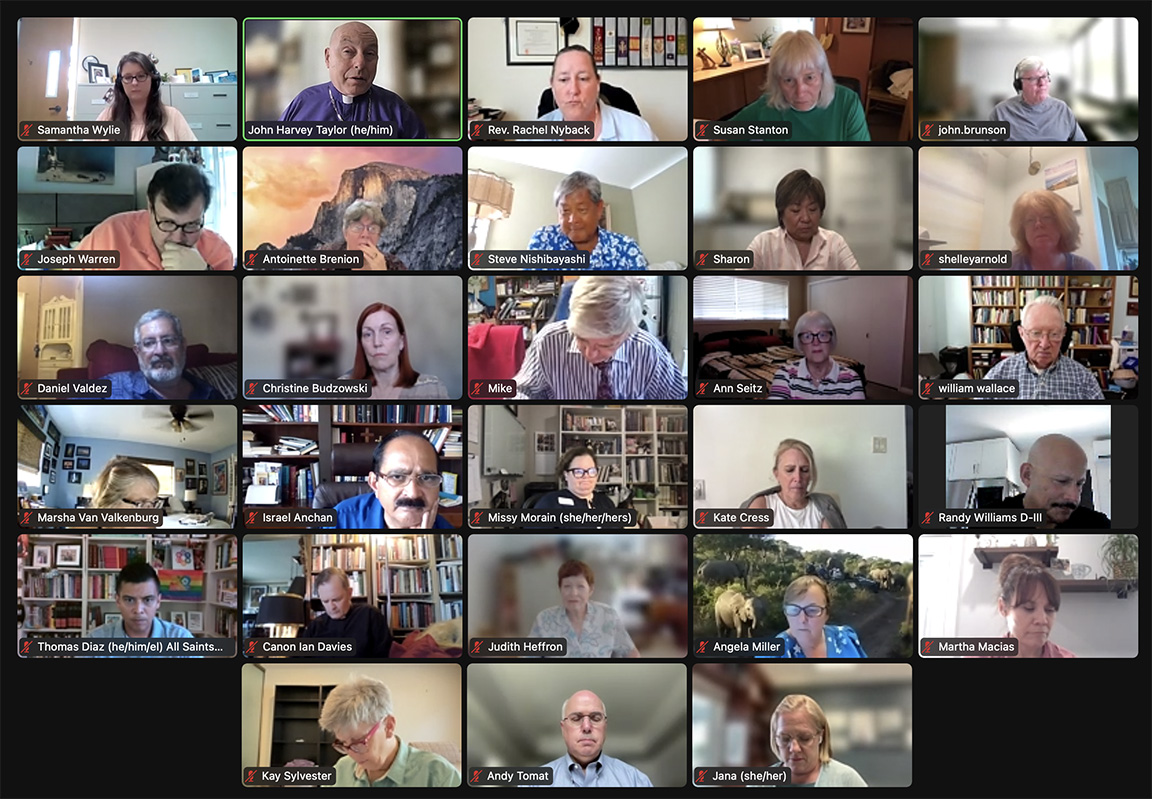
Diocesan Council meets via Zoom on July 11, 2024. (Not all who attended are pictured.) Photo: Screenshot
[The Episcopal News] Diocesan Council, meeting on July 11 via zoom, heard what Bishop John Harvey Taylor approvingly called an “undramatic” report from the treasurer of the diocese; learned more about the innovative progress at the Center for Lay Chaplaincy and Prism; and got the inside scoop on L.A.’s presence at the recent meeting of General Convention.
Finance report
Canon Andy Tomat, treasurer of the diocese, told the council that Mission Share Fund assessment payments from congregations are running close to budget, and that in May a previous shortfall has been reduced by 42% in May. As a result, diocesan operations are running on a solidly break-even basis so far this year. He expressed appreciation for the parishes that have adjusted well to the new assessment process and made their payments on a timely basis, as well as the mission congregations that continue to contribute 10% of their incomes to MSF and 5% to other assessments. Several congregations are also paying down prior year shortfalls, and several others are voluntarily paying above the minimum 12%, he said, adding that the finance team is grateful for this generosity. He was, he said, “generally very, very happy with the results we’re seeing so far this year.”
Tomat also reported that Seeds of Hope, the diocese’s food justice ministry, expects to receive higher levels of support from the L.A. County Health department for their nutrition education program, and is also now generating additional revenue from concession booth at the L.A. Memorial Coliseum offering healthy alternative food choices. He encouraged anyone attending events there to visit the Seeds of Hope booth.
“There’s nothing better in midsummer than an undramatic treasurer’s report,” quipped Taylor as Tomat concluded his remarks.
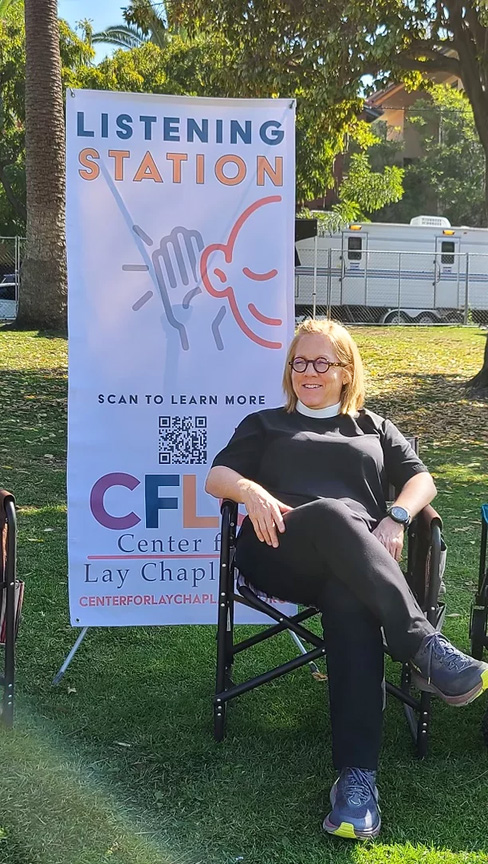
Jana Milhon-Martin, director of the Center for Lay Chaplaincy, staffs a listening booth in 2022. Photo: CFLC
Ministry report: The Center for Lay Chaplaincy and Prism
The Rev. Jana Milhon-Martin, director of the diocese’s Center for Lay Chaplaincy, and Sharon Crandall, director of Prism, the restorative justice prison ministry, shared the progress of their work, beginning with a video that featured thoughts from chaplains and inmates about Prism’s work in Los Angeles County jails.
Crandall explained that Prism’s “work and spiritual care and being chaplains extends way beyond the walls of the jails” to people who have been released from jail as well as those serving life sentences.
Prism’s work has three major components, Crandall said: one-on-one visits with inmates; church services; and classes on subjects such as centering prayer. She particularly pointed out the classes taught for gay and trans inmates, many of whom have ignored or traumatized by other faith groups that demonize them or try to “pray away” their sexual orientation.
“There’s a lot of toxic chaplaincy happening in the L.A. County jails,” Crandall said. “And so the Episcopal Church really provides that spiritual care to even the margins within the margin – and I would say that’s primarily the gay and trans unit of Men’s Central Jail.” Other chaplaincy groups choose not to go there very often, she said, but added that the Episcopal chaplains find that their style of worship appeals to many inmates. “We’ve found it to be a very beautiful place,” she said. “As chaplains, we just try to get out of the way and let the liturgy carry itself.”
Prism’s 16 chaplains – 11 laypersons and five ordained clergy representing eight congregations – are all volunteers. They have contact with more than 300 men and women in the jail system each month. Crandall singled out a priest who leads worship in the gay-trans unit at Men’s Central Jail. “He [walks] in there in his collar and [says], ‘My name is the Rev. Joey Courtney. I’m an Episcopal priest, and I am gay.’ And it’s such a powerful thing.”
Episcopal lay chaplains, who are all volunteers, are trained for their work through the CPE (clinical pastoral education) program required for ordained priests and deacons, which is not the case for volunteer chaplains of most other faith groups. Only the Roman Catholic chaplains, Crandall said, are paid for their work.
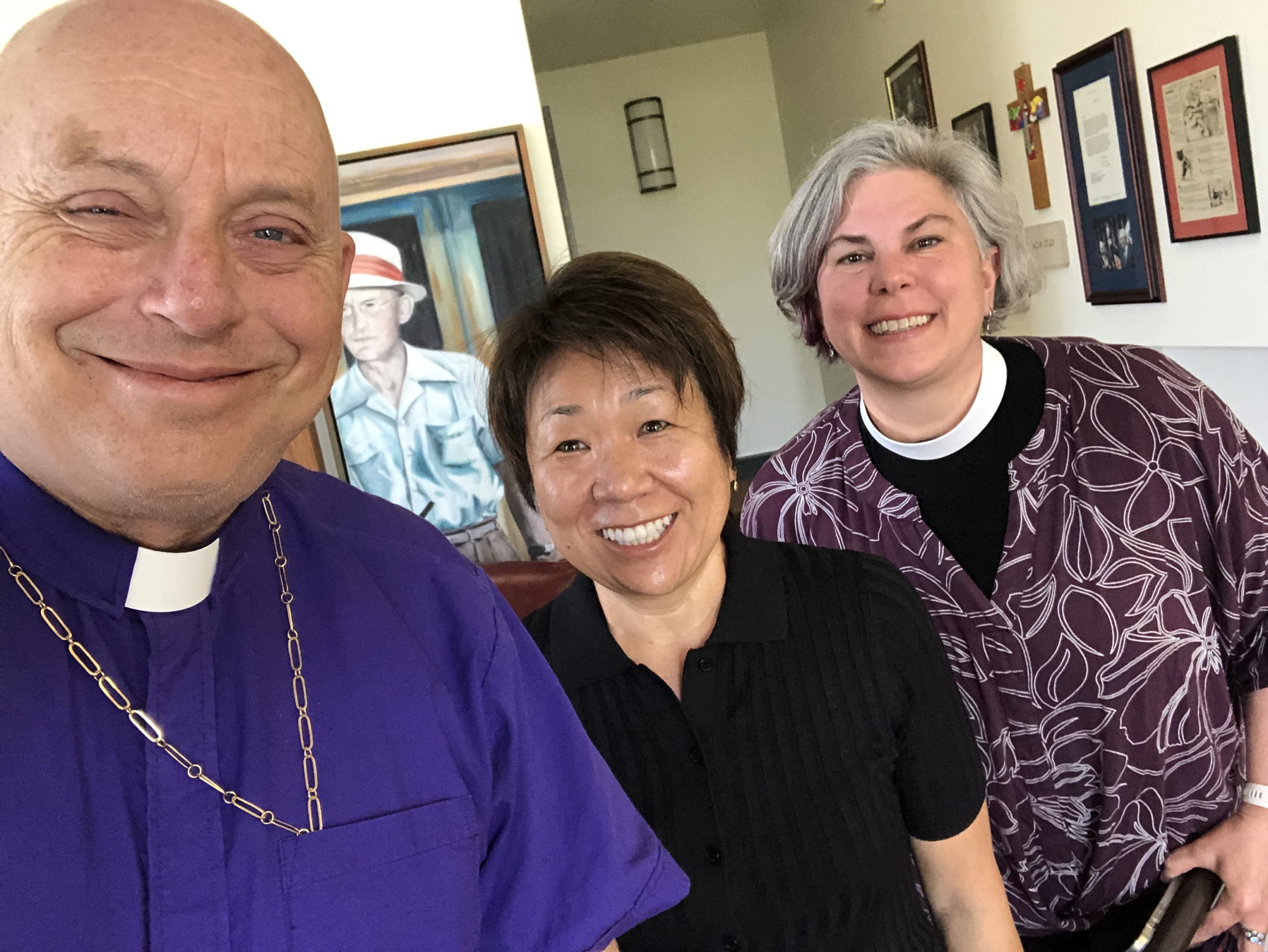
Bishop John Harvey Taylor meets with Sharon Crandall, director of Prism, the diocese’s prison chaplaincy program, and Canon to the Ordinary Melissa McCarthy in his office at St. Paul’s Commons. Photo: John Taylor
Milhon-Martin continued the narrative with the story of CFLC, which began with funding from a three-year Trinity Church Wall Street grant. Its mission is to train laypeople to serve as chaplains not only in jails and hospitals, but also in shelters and food banks and other places where people have little or no spiritual care. The Episcopal Church, she said, “has this real charism that we can share with the world by training lay people and putting them in those spaces and providing chaplaincy where it’s needed.”
Recognizing that CPE training is vital for anyone doing ministry, Milhon-Martin and her team worked with 39 laypeople in the diocese “from really diverse contexts” to develop a new, effective, but shorter-term CPE curriculum for laypeople. “And we’re really pleased with it. But what we’re starting now to understand is [the training] needs to be adapted to be more accessible.” Training, she said, is necessarily time-intensive and must be done in small groups. “So right now, it’s 12 weeks, four hours a week, which compared to a traditional [CPE] unit is nothing. But the feedback we’re getting is it needs to be even more compressed”; perhaps, she said, a retreat weekend followed by online classes.
“The Iona Collaborative at Seminary of the Southwest has contracted with us to provide adapted CPE for the ordinands they’re working with in several dioceses,” Milhon-Martin said. “And what we’re hoping to do in the next couple of years is to develop an apparatus by which to train facilitators who can use this curriculum, so a parish could run an adapted CPE program for their parishioners for relatively little cost, or dioceses could.” CFLC’s model, she added, has had a “huge response” from across The Episcopal Church.
Other reports
Joseph Warren reported that the Corporation of the Diocese met to approve 14 grants from the One Body & One Spirit annual appeal fund. “We approved $67,000 to go to different missions and parishes and institutions and ministries,” he said. “And that was a wonderful, wonderful experience.”
Taylor reminded the council that money for the fund is raised through regular appeals sent by email to church members whose digital addresses are made available by their congregations – the same addresses used to send The Episcopal News Update.
“Every single dollar that we raise goes back out the door in the form of a grant – it is a very exciting program,” said Taylor. “But we can only raise money from the people who get our email. And at this point, we still are basically, I think, reaching – if we’re lucky – 20% of the members of the parishes and missions of the Episcopal Diocese of Los Angeles.
“But if you like the idea that two times a year we’re sending 60 or 70 or $80,000 out the door to parishes and missions to fix roofs and run programs, and do all kinds of other things, and you want us to keep that going, help us expand the donor base by helping us reach as many people as we can with the emails.”
Kate Cress reported that the Standing Committee is beginning consultation with Bishop Todd Ousley of the Episcopal Church Office of Pastoral Development on planning the transition to a new bishop when Taylor retires near the end of 2026.
Christine Budzowski, diocesan president of the Episcopal Church Women, told the council that she and other delegates from the L.A. diocese attended the ECW Triennial and Daughters of the King meetings that ran concurrently with General Convention. She noted that the current president of the Province 8 ECW is Madeline Sampson of Fort Defiance, Arizona, located on the Navajo reservation. “With Madeline at the helm provincewide, we can expect a bit more focus on our indigenous brothers and sisters,” said Budzowski.
She also reported that the Daughters of the King of the diocese offers a three-month online “Discerning the Call” program for women who are considering becoming members of DOK, or for members who want to renew their vows or re-educate themselves about the order. Budzowski said that the program, which she and outgoing DOK President Kimberly Cortner designed, soon will be offered in Spanish with the help of the Rev. Melissa Campbell-Langdell, bilingual rector of All Saints/Todos los Santos Church in Oxnard and Sandra Martinez Moore, a leader of Hispanic ministries in the diocese. Budzowski invited all women of Spanish-speaking congregations interested in joining the new program, which is organized in six two-hour sessions, to contact her at christine@trinitywebconsulting.com.
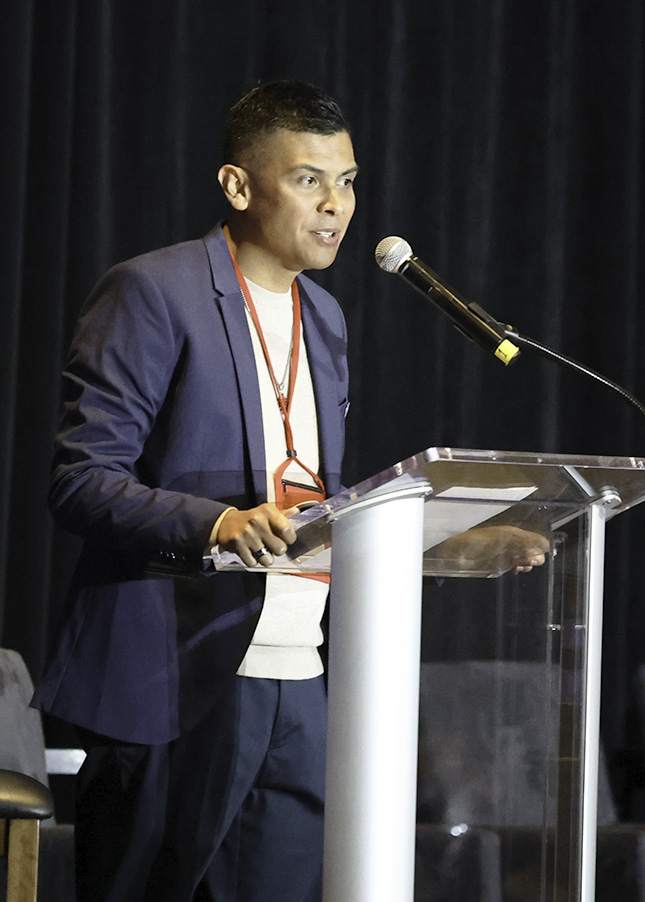
Thomas Diaz, deputy from the Diocese of Los Angeles and member of the nominating committee for the presiding bishop, moderates a forum with the five candidates at General Convention. Photo: Janet Kawamoto
General Convention reports
Thomas Diaz, liaison to council from the diocese’s General Convention deputation, praised the deputation chair, the Rev. Rachel Nyback, rector of St. Cross Church, Hermosa Beach, for her guidance and organization during the recent meeting in Louisville, Kentucky. He also lauded The Episcopal News’ daily reports from convention. Diaz, who was a member of the nominating committee for the presiding bishop election, reported that House of Bishop elected Bishop Sean Rowe to that position. The House of Deputies reelected Julia Ayala Harris as its president, and the Rev. Steve Pankey as vice president.
Diaz said that the convention approved several constitutional changes to the Book of Common Prayer and supported changes to seven dioceses that either combined or changed status. (Full convention coverage from Episcopal News Service is here.) The next General Convention will meet in 2027 in Phoenix, Arizona.
Taylor remarked that the Los Angeles diocese has “a huge footprint” at General Convention. “I don’t believe there’s any diocese, even among the Valhalla of the top five or six dioceses, of which we are one, which is better represented than Los Angeles,” he said.
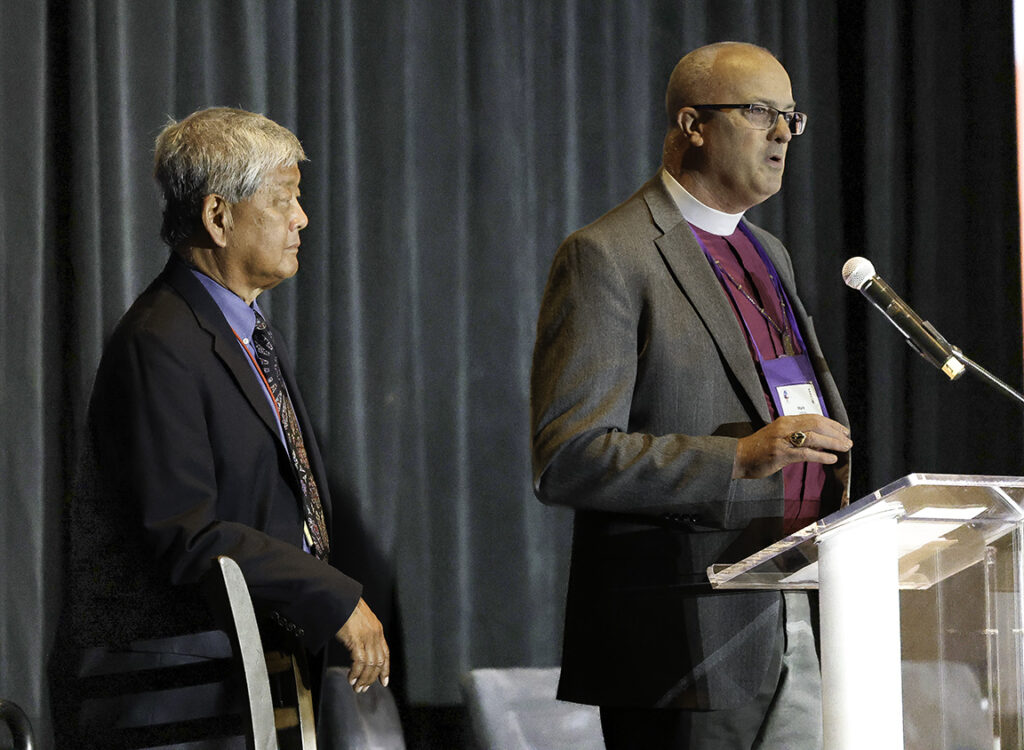
Canon Steven Nishibayashi, left, and Bishop Mark Lattime of Alaska, co-chairs of the joint nominating committee for the presiding bishop, welcome attendees at the candidates’ forum on June 21 in Louisville, KY. Photo: Janet Kawamoto
Secretary of Convention Steve Nishibayashi noted that 121 days remained until the next Diocesan Convention, meeting in Riverside, Nov. 8 – 9, and reminded council members that each deanery needs to select a youth delegate for convention, and that offices are open to be voted on at that meeting. He also asked congregations to keep his office notified of any changes in their delegates.
Nishibayashi, who was co-chair with Bishop Mark Lattime of Alaska of the joint nominating committee for the presiding bishop, told the council that Diaz did an excellent job moderating a forum for the candidates on June 21, two days before the convention officially started. (Read more from The Episcopal News and Episcopal News Service.)
Nishibayashi said that he saw the elections of the presiding officers, both of which were completed on the first ballot, and the House of Deputies vice president, accomplished in two ballots, as signs that the convention was “supportive of where we are, and where we hope to go.”
Taylor, who as a member of the House of Bishops was present at the Louisville cathedral for the presiding bishop election, affirmed Nishibayashi’s assertion about the collegiality of the voting process. “Bishop-elect Rowe’s minute attentiveness to the structures of the church and stated mission of learning what’s happening that’s exciting and innovative in the dioceses, and empowering it, as well as getting the word out to the rest of the church about what’s happening locally, was just very exciting to all of us,” Taylor said.
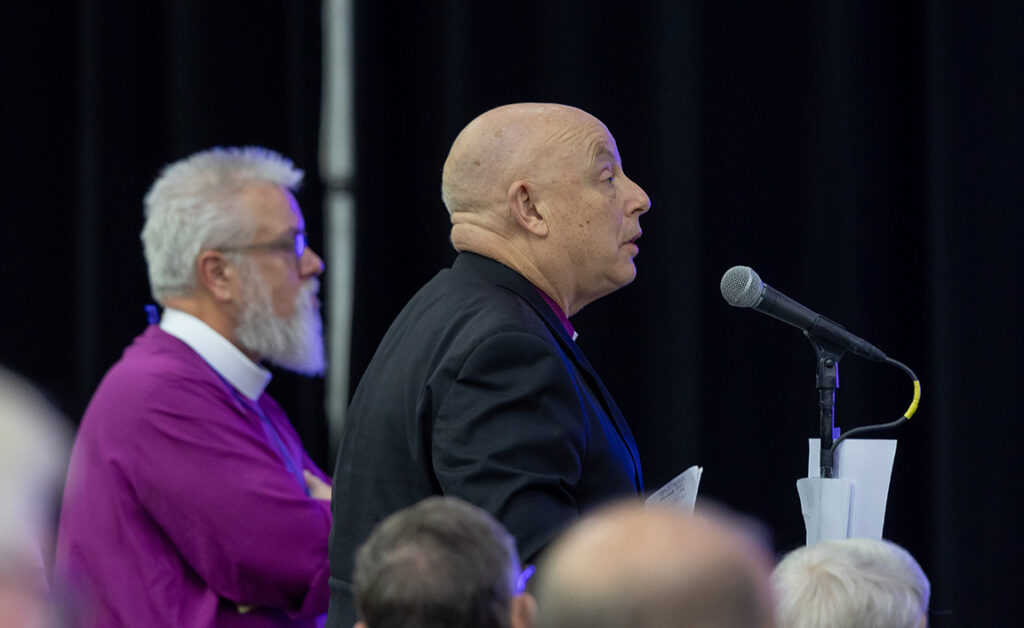
Bishop John Harvey Taylor addresses the House of Bishop at the 2024 General Convention in Louisville, Kentucky.
Bishop’s report
Taylor told the council that Canon to the Ordinary Melissa McCarthy, who recently underwent successful spinal fusion surgery, has been recovering at home, though also continuing much of her work.
The bishop said that Samantha Wylie, convention coordinator and secretary of Diocesan Council, did extensive work preparing for General Convention, and making sure that deputies, the bishop, diocesan staff and other attendee had all the support they needed before traveling to Louisville. Taylor said that Canon Tomat, also a lay deputy, “kept track of all the resolutions, all of the legislation, and sent estimably valuable daily reports to the deputation about things that were coming up that he wanted to make sure that we knew about.” Tomat also rose in the House of Deputies to oppose a measure that would have decreased assessments on Episcopal Church dioceses to 10% from the current 15% – a measure that would have gutted the church’s revenue by more than $30 million. The resolution was defeated.
Taylor outlined his own work with other bishops and lay leaders to find language that all would find acceptable to express the church’s concern about the Israel-Palestine conflict, a subject he wrote about in a blog post and that ENS reported in its convention coverage. The compromise measure, which omitted the word “apartheid,” passed both houses.
He also spoke about his efforts in support of the single resolution on prison reform brought before the convention, which he contrasted to at least 18 resolutions on Israel and Palestine. (He addressed the discrepancy in a Juneteenth blog post.) The original resolution, crafted by a team that included expert and activist Hannah Bowman of St. Michael and All Angels in Studio City, favored abolition of the U.S. police and prison system. Taylor praised the legislative committee that revised the resolution, lifting up prison reform instead of abolition, though the resolution still failed to pass the House of Bishops. Taylor and others resolved to form a working group to bring a prison reform resolution to Executive Council or the next General Convention.
Other reports
Canon for Common Life Bob Williams said that Matthew Borsch, middle son of the late Bishop Frederick Houk Borsch, died recently of stomach cancer. Services were held the day after the council meeting at his home parish in Lithgow, New York.
The Program Group on Black Ministries will hold a Caribbean Peoples’ Celebration at St. John’s Cathedral on Sunday, July 21 at 5 p.m., Williams said. He mentioned the annual Lotus Festival at Echo Park Lake July 13-14, which featured a booth representing St. Athanasius’ Church and other ministries at St. Paul’s Commons.
He also announced several coming events:
- The diocese’s second annual Climate Change Summit, to take place in November on a date to be determined
- “Losing Truth,” a two-part webinar sponsored by the Program Group on Ecumenical and Interfaith Life under the leadership of chair Dot Leech, at which psychologists, social media experts, religious leaders and others will discuss the effect that the loss of truth has had on society. (Dates to be announced.)
- Evensong to mark the 30th anniversary of St. Paul’s Commons on Sunday, Oct. 20 at 5 p.m., celebrated by the Rev. John Watson, priest in charge of St. Athanasius’ Church and Church of the Epiphany, East Los Angeles.
Williams also noted that the diocese is seeking a communications coordinator; the job description is here. Applications will be accepted until about the end of July.
Diocesan Council will not meet in August. Its next meeting will be held via Zoom on Thursday, Sept. 12 at 4 p.m.
